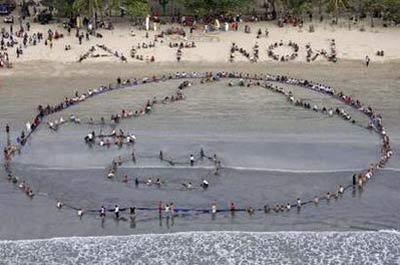Climate Conservatives, the Grassroots Defenders and Business Community
Awicaks
I was in a straddling position. My heart is with the grassroots -the heck with textual acrobatic battle in the cool air conditioned conference rooms- but my professional job was with the climate conservatives -hammering the 'bad guys' to commit the Kyoto Protocol-. And that wasn't easy, as both parties are in tendency to be in opposite direction (though the goal seems alike, but the mindsets are extremely different).
I've been in conservatism before. Long way back in late 90s. And I then said, "Enough with these political crafts and hypocrites." TIhat was a same turning point to my personal belief on natural resources issues, leaving behind all my sins guiding people to use then many novel approaches combining allien democratic values and practical science, romanticising traditional and indigenous wisdom, whilst overlooked the very changes in people's production and consumption.
 I talked to and worked with wide array of people and friends during the two-weeks Bali conference. Most of them are linear thinker, believing the existing structure as the only vehicle to solution. "There's no other way. And we don't have luxury in time to endeavour such vehicles." Which is true. But half true when considering its impacts once the structure starts to work. Only few of them are the learning creatures. Very limited numbers of people compared to the hubbubs and noisy arguments of monetary solution to the climate crisis. Their voices are, however, worrysome to most of the established conservatives, denouncing UNFCCC sets of solution as aggressive as the promotion made by markets speculatives under the umbrella of BINGOs (Business Internatinal NGOs).
I talked to and worked with wide array of people and friends during the two-weeks Bali conference. Most of them are linear thinker, believing the existing structure as the only vehicle to solution. "There's no other way. And we don't have luxury in time to endeavour such vehicles." Which is true. But half true when considering its impacts once the structure starts to work. Only few of them are the learning creatures. Very limited numbers of people compared to the hubbubs and noisy arguments of monetary solution to the climate crisis. Their voices are, however, worrysome to most of the established conservatives, denouncing UNFCCC sets of solution as aggressive as the promotion made by markets speculatives under the umbrella of BINGOs (Business Internatinal NGOs).
People who believe to the sets of UN solutions are most of them coming from established international NGOs, corrupted politicians and buraucrates from the developing South, and politicians from the North who are under the political-financing and payroll of gigantic web of global capitals. People who disbelieve are the opposites. However, they are wrongly interpreted by public as represented by the mainstream press and media. As Indonesia's Tempo newspaper states, "Those who don't believe to the sets of UN solutions are the losers, building solidarity camps hundred meters away from the main negotiations."
I've been disturbed for quite a while with the thinking, "How come the UN who had long been proven ineffective in handling many humanitarian works throughout the planet, dares to become the umbrella of the ongoing and future massive catastrophes due to climate change?"
And I've been frustrated seeing how Indonesian politicians and bureaucrates stick with the supremacy of the World Bank and all its auxiliary hands. "How come the World Bank who had long been proven very effective to create poverty, destroy grassroots' resilient and degrade the environment through flooding financial aids and credits to the developing South, dares to promote new financial mechanism to save the forests?"
I, however, was in the position to use the mainstream mindset to push a goal on moratorium of deforestation and peatland conversion, which do not necessarily relate the political negotiation in those climate conference. But I have to use the mainstream mindset in order to get buy-in. However, deep in my heart, I couldn't lie to myself not to consider primarily the current status of crisis facing the local grassroots in Indonesia. My doubt to high-level technocratic solution is as big as my belief to locally initiated solution. What I could do was simply entertaining myself with pragmatic thought, "No worries, it's a merely tactical way to achieve the noble goal...."
Some friends who are now deeply engaging lucrative professions keep saying that, what I do are extremely useful for them to streamline their business culture. It reminds me to my own saying, "NGOs are globally bankrupt!" All novel and sophisticated approaches developed for the past fifteen years that are socially sensitive, environmentally friendly and political enlightening have long been adopted by the business community, and even furtherly developed as glossy points of their marketing strategy. Any attacks by NGOs towards big corporatons, the World Bank, Asian Development Bank, WTO and other gigantic structures have been well-absorbed, and even strengthened those institutions' bargaining position towards developing states' administrations.
So where am I in the middle of the ongoing circus of carbon trading, carbon markets, hundred of pledges worth billion of dollars, wishful thinking, and also angers, frustration?
19 December 2007
Read more... Sphere: Related Content









No comments:
Post a Comment